|
|
70 - 120MHz FM Receiver
This simple one chip FM receiver / TV tuner will allow you to receive frequencies from 70 up to 120MHz. With this small receiver it is possible to pickup TV stations, entire 88 - 108MHz FM band, aircraft conversation and many other private transmissions. It is a perfect companion to any FM Transmitter especially if FM band in your area is very crowded. TDA7000 receiver offers very good sensitivity therefore it will even allow you to pickup weaker signals that cannot be heard on conventional FM receivers.
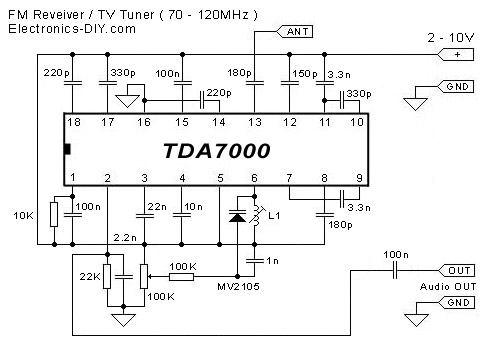
Simple FM Receiver
With the TDA 7000 you can build an FM radio with a minimum of components; most of them so easy to manage...like the ceramic capacitors that do not require polarization...and only two resistors. The components you will employ will be of small dimensions and low cost. Even the integrated circuit itself, the TDA 7000, is not of great cost.
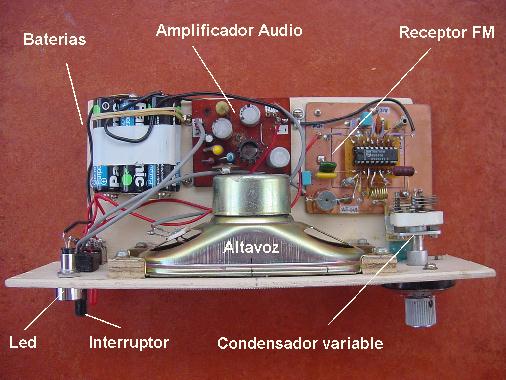
27 MHz Receiver
This is a simple RF receiver mainly for low-distance digital radio receiver application. The analog output of this circuit should be connected to a schmitt-trigger signal conditioning circuit with a proper value capacitor (from collector of T3). L1 for 27Mhz is about 10 turns, 6 mm diameter coil body.
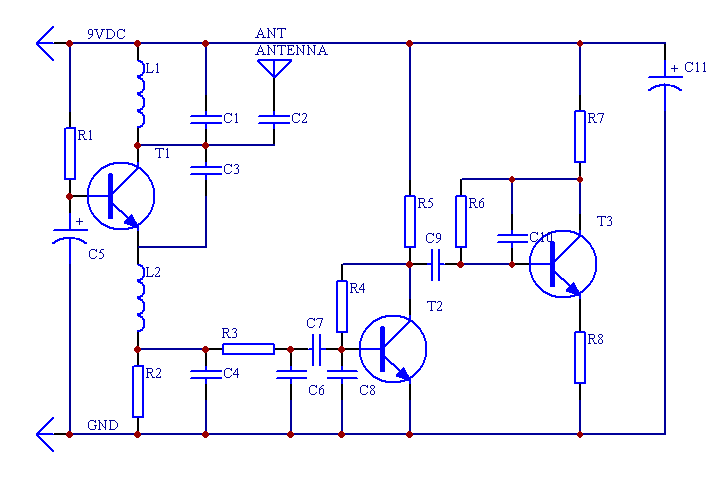
27MHz / 49 MHz Walkie Talkie
Lots of people are requesting walkie-talkie and RF remote control schematics, so here is some. Building these circuits needs special equipment and expertise in RF circuits. If you are going to experiment with these circuits, please note that I did not build them, and I am not able to help you with any details. If you have no experience in RF, I suggest that you choose the easy way and buy a ready-made RF module. Otherwise you can realize you have an exact copy of a circuit in your hand, still it doesn't work the way it should.
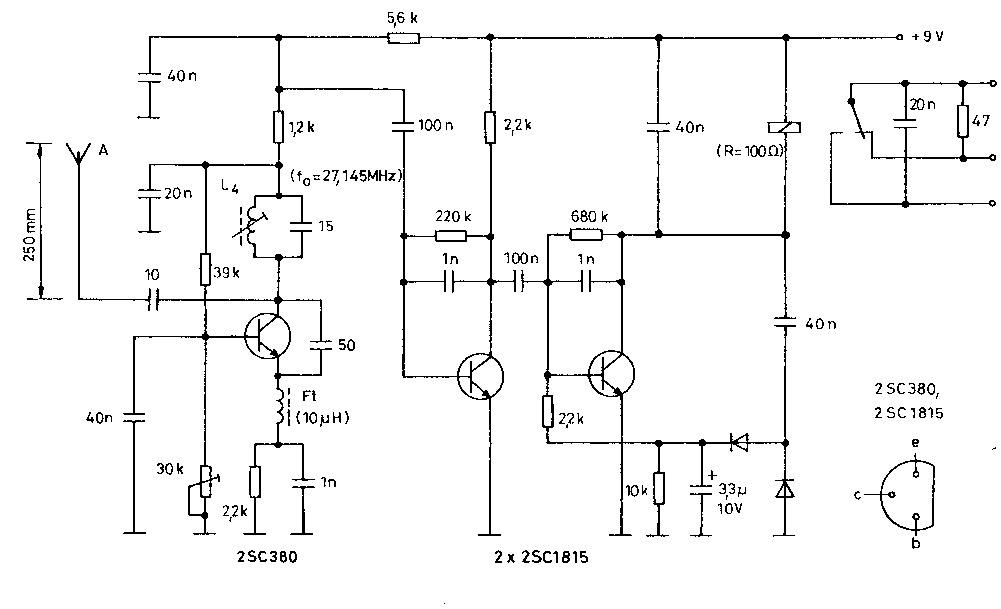
4 Transistor FM Receiver
This is a pocket sized receiver I built in 1994. The idea was to make a simple but useable receiver running off 3V. My previous 6 transistor receiver was more bulky, requiring 12V. This meant 10 x AA cells. I designed and made a PCB, and constructed a small aluminium case to keep the receiver as comact as possible. There is nothing unusual with this design. The detector uses a simple Colpitts oscillator and is of a type commonly used in other super regen receivers. Of course it is self quenched. Sensitivity with this type of detector is relatively low, but it's simple and easy to get working. As always, I provided a regeneration control to set the optimum operating point; ie. max sensitivity and minimum SCA/stereo subcarrier beat.
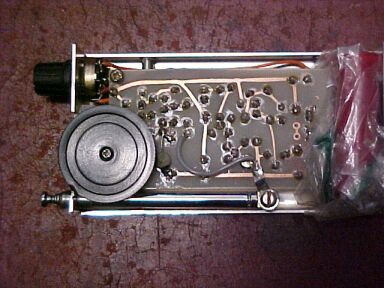
Aircraft / Airplane Radio Receiver
The communications between commercial aircraft and the ground can be interesting, amusing and sometimes even disturbing. However radios that receive the approximately 220MHz to 400MHz band commonly used for aircraft (both military and commercial) are not easily found. And scanners can be complicated, large and expensive. With an easy to build circuit such as this one, everyone can enjoy listening in on these conversations.
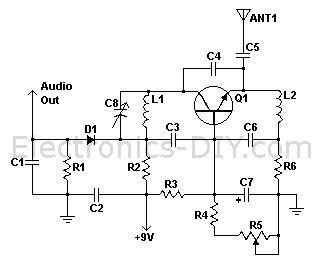
Aircraft Transmission Receiver
This passive airband receiver is basically an amplified "crystal radio" designed to receive nearby aircraft transmissions on 121 - 133 MHz frequency. Useful for listening to the pilot transmissions. The input tuned cct 'L' is a 2 turn loop, with 30mm diameter measured at 0.15uH on my LC Meter which intercepts RF directly as opposed to an LC cct fed with external aerial. Tuning capacitor is a 30pF Philips Beehive trimmer, with a short length of plastic tube glued - as a tuning shaft. Capacitance runs from 28 to 7pF; which by formula gives a frequency range of 77 - 155MHz. Detector uses a biased 1N5711 (or similar) schottky diode with lowest forward-biassed voltage drop. The two 10M resistors bias the detector diode and the op-amp input near mid-rail for better detector efficiency. LM358 dual op-amp draws less than 1 ma so the battery drain is minimal. Insertion of earphones plug completes supply circuit and acts as an on/off switch. 9V battery fits neatly inside a 30mm x 130mm long PVC tube.
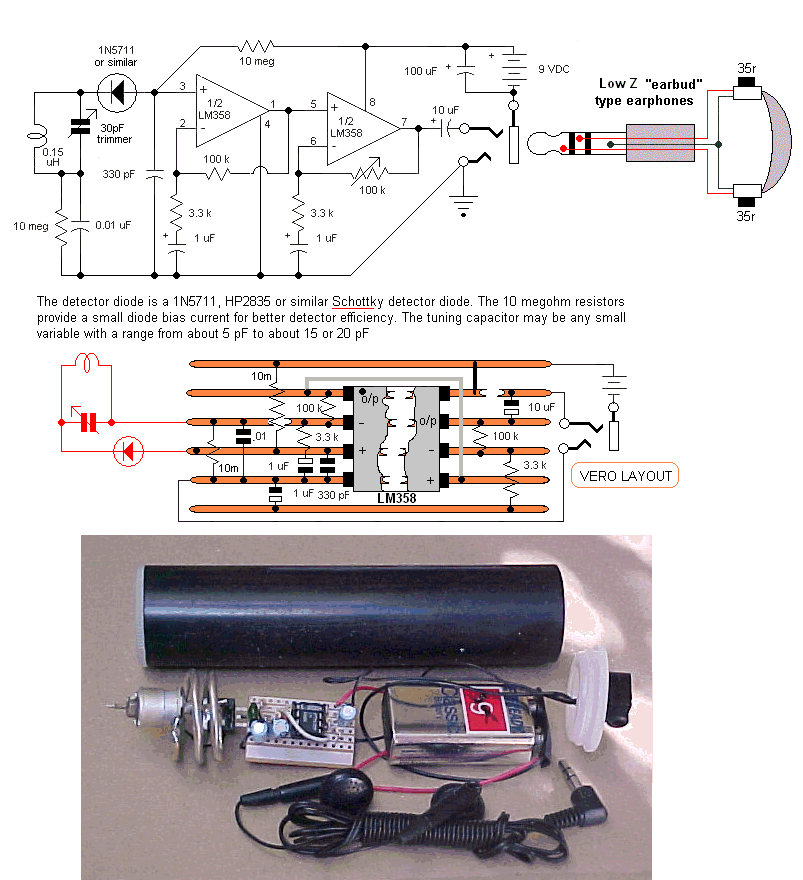
AM Radio built around LM555
AM radio built around 555 timer chip. The only active device (silicon, germanium, or otherwise) is the LM555. The tuning is accomplished with an inductor and a capacitor, and the LM555 acts as an AM demodulator and class-D power amplifier to drive the speaker. You may be wondering how all this is accomplished with a 555. Here’s how the circuit works: The AM radio signal is tuned by inductor L, which is 300 turns of wire on a 1/2 inch diameter cardboard tube made out of a paper roll, along with the 100pF variable capacitor. One end of the parallel configuration of L and C connects to an antenna (surprisingly long!) and the other end connects to a ground wire which is tied to the AC outlet ground (old books tell you to ground it to a water pipe). So far this is exactly like an AM crystal radio.
The 555 timer is configured as a pulse width modulator in a non-traditional configuration. If I used the standard approach and connected the input to the CV pin, the low impedance of the pin would prevent the circuit from receiving any radio signals. I had to invert the circuit and tie both high impedance analog pins, Threshold and Trigger to the radio signal input. This is the reason why the CMOS version of the 555 timer performs much better than the standard bipolar, which has higher input bias current.
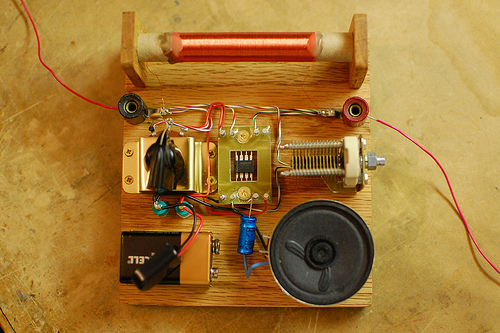
Crystal Detector Radio Receiver Set Varactor Varicap Capacitor Diode Tuned
Traditionally, in a crystal detector radio tuned circuits, a mechanical type variable capacitor is used. For those of you who would like to eliminate this mechanical component, here is a modern version of the classic detector set. This radio, as shown on Figure 1, uses a varactor diode instead of the usual mechanical rotary device. The varactor is also known as a variable capacitance or a varicap diode. It provides an electrically controllable capacitance, which can be used in many different circuits. Varactors are small and inexpensive, which makes their use advantageous in many applications. Its disadvantages are a lower Q (quality), nonlinearity, lower voltage rating and a more limited capacitance range. A tuned circuit with a higher Q has a narrow pass-band that makes it better able to pick out a station of many equally strong. A lower Q tuned circuit has a wider pass band. It allows more neighbor stations through and makes listening to either radio stations frustrating. Frequency change with a varactor diode equipped tuned circuit is as simple as a voltage change.
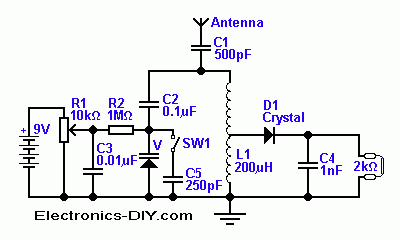
Direct SW Receiver for AM, AM-SSB & CW Signals
Home » Radio » Direct SW Receiver for AM, AM-SSB & CW Signals
Direct SW Receiver for AM, AM-SSB & CW Signals
Advertisement
SSB stands for Single Side Band, which signifies the amplitude - modulated signal which gets its signal carrier and one sideband suppressed in the transmitter. Carrier suppressing gives huge savings in transmission power (the power necessary to accomplish the desired reach of the signal is significantly smaller than in the conventional - type transmitters), and cancellation of one sideband makes the signal have its spectrum two times narrower, allowing twice as many transmitters as usual to be placed into the same bandwidth.

|
|
|
| |
Accurate LC Meter
Build your own Accurate LC Meter (Capacitance Inductance Meter) and start making your own coils and inductors. This LC Meter allows to measure incredibly small inductances making it perfect tool for making all types of RF coils and inductors. LC Meter can measure inductances starting from 10nH - 1000nH, 1uH - 1000uH, 1mH - 100mH and capacitances from 0.1pF up to 900nF. The circuit includes an auto ranging as well as reset switch and produces very accurate and stable readings. |
|
PIC Volt Ampere Meter
Volt Ampere Meter measures voltage of 0-70V or 0-500V with 100mV resolution and current consumption 0-10A or more with 10mA resolution. The meter is a perfect addition to any power supply, battery chargers and other electronic projects where voltage and current must be monitored. The meter uses PIC16F876A microcontroller with 16x2 backlighted LCD. |
|
|
|
60MHz Frequency Meter / Counter
Frequency Meter / Counter measures frequency from 10Hz to 60MHz with 10Hz resolution. It is a very useful bench test equipment for testing and finding out the frequency of various devices with unknown frequency such as oscillators, radio receivers, transmitters, function generators, crystals, etc. |
|
1Hz - 2MHz XR2206 Function Generator
1Hz - 2MHz XR2206 Function Generator produces high quality sine, square and triangle waveforms of high-stability and accuracy. The output waveforms can be both amplitude and frequency modulated. Output of 1Hz - 2MHz XR2206 Function Generator can be connected directly to 60MHz Counter for setting precise frequency output. |
|
|
|
BA1404 HI-FI Stereo FM Transmitter
Be "On Air" with your own radio station! BA1404 HI-FI Stereo FM Transmitter broadcasts high quality stereo signal in 88MHz - 108MHz FM band. It can be connected to any type of stereo audio source such as iPod, Computer, Laptop, CD Player, Walkman, Television, Satellite Receiver, Tape Deck or other stereo system to transmit stereo sound with excellent clarity throughout your home, office, yard or camp ground. |
|
USB IO Board
USB IO Board is a tiny spectacular little development board / parallel port replacement featuring PIC18F2455/PIC18F2550 microcontroller. USB IO Board is compatible with Windows / Mac OSX / Linux computers. When attached to Windows IO board will show up as RS232 COM port. You can control 16 individual microcontroller I/O pins by sending simple serial commands. USB IO Board is self-powered by USB port and can provide up to 500mA for electronic projects. USB IO Board is breadboard compatible. |
|
|
|
|
ESR Meter / Capacitance / Inductance / Transistor Tester Kit
ESR Meter kit is an amazing multimeter that measures ESR values, capacitance (100pF - 20,000uF), inductance, resistance (0.1 Ohm - 20 MOhm), tests many different types of transistors such as NPN, PNP, FETs, MOSFETs, Thyristors, SCRs, Triacs and many types of diodes. It also analyzes transistor's characteristics such as voltage and gain. It is an irreplaceable tool for troubleshooting and repairing electronic equipment by determining performance and health of electrolytic capacitors. Unlike other ESR Meters that only measure ESR value this one measures capacitor's ESR value as well as its capacitance all at the same time. |
|
Audiophile Headphone Amplifier Kit
Audiophile headphone amplifier kit includes high quality audio grade components such as Burr Brown OPA2134 opamp, ALPS volume control potentiometer, Ti TLE2426 rail splitter, Ultra-Low ESR 220uF/25V Panasonic FM filtering capacitors, High quality WIMA input and decoupling capacitors and Vishay Dale resistors. 8-DIP machined IC socket allows to swap OPA2134 with many other dual opamp chips such as OPA2132, OPA2227, OPA2228, dual OPA132, OPA627, etc. Headphone amplifier is small enough to fit in Altoids tin box, and thanks to low power consumption may be supplied from a single 9V battery. |
|
|
|
|
|
Arduino Prototype Kit
Arduino Prototype is a spectacular development board fully compatible with Arduino Pro. It's breadboard compatible so it can be plugged into a breadboard for quick prototyping, and it has VCC & GND power pins available on both sides of PCB. It's small, power efficient, yet customizable through onboard 2 x 7 perfboard that can be used for connecting various sensors and connectors. Arduino Prototype uses all standard through-hole components for easy construction, two of which are hidden underneath IC socket. Board features 28-PIN DIP IC socket, user replaceable ATmega328 microcontroller flashed with Arduino bootloader, 16MHz crystal resonator and a reset switch. It has 14 digital input/output pins (0-13) of which 6 can be used as PWM outputs and 6 analog inputs (A0-A5). Arduino sketches are uploaded through any USB-Serial adapter connected to 6-PIN ICSP female header. Board is supplied by 2-5V voltage and may be powered by a battery such as Lithium Ion cell, two AA cells, external power supply or USB power adapter. |
|
200m 4-Channel 433MHz Wireless RF Remote Control
Having the ability to control various appliances inside or outside of your house wirelessly is a huge convenience, and can make your life much easier and fun. RF remote control provides long range of up to 200m / 650ft and can find many uses for controlling different devices, and it works even through the walls. You can control lights, fans, AC system, computer, printer, amplifier, robots, garage door, security systems, motor-driven curtains, motorized window blinds, door locks, sprinklers, motorized projection screens and anything else you can think of. |
|
|
|
|